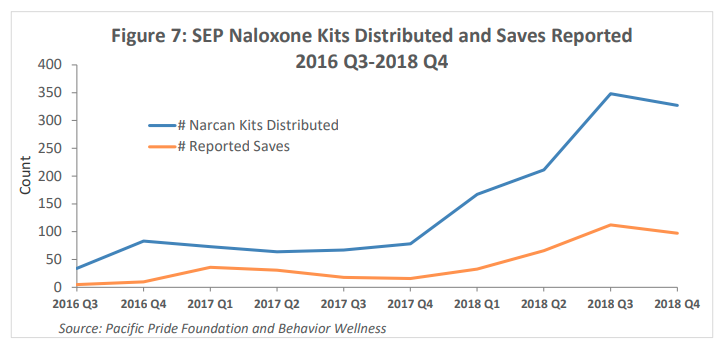Opioid Antidote Usage Soars
Pacific Pride Foundation’s Needle-Exchange Program Presents Results

A syringe-exchange program has successfully reduced the transmission of HIV in Santa Barbara County through shared needles, but a new program to distribute naloxone — the opioid overdose antidote — has brought a surge of clients to the program. Originally, the free exchange of used needles for new ones was conceived as part of the battle against the deadly HIV/AIDS epidemic; for 2017-2018, intravenous drug use was connected with fewer than 10 percent of the 59 new HIV (human immunodeficiency virus) infections in the county. The program, sponsored by the Pacific Pride Foundation, began dispensing naloxone about three years ago. Since then, 1,452 kits were distributed, and 424 overdoses are known to have been prevented.
“We have been working to address the national opioid overdose crisis locally with our syringe-exchange clients for the last few years, training them on Narcan,” said Colette Schabram, executive director of Pacific Pride, referring to naloxone’s product name. “We also go out into the community to train medical teams, law enforcement, and outreach providers on how to administer the overdose medication. This has resulted in our program seeing specialized and impactful results in the community,” she added, as reflected in the striking statistics in a report submitted to the County Board of Supervisors on December 10.
About 20 percent more people used the syringe-exchange program, largely due to the availability of naloxone and consistent service at the three locations, the report stated. As well, 58 percent who sought services were referred for substance-abuse counseling, and 21 percent were referred to mental health services.
The distribution of naloxone — which is administered as a nasal spray — skyrocketed from 282 in 2017 to 1,053 in 2018, Joy Kane with County Public Health told the Independent after the hearing. It reversed 101 overdoses in 2017 and 308 in 2018, she said. The medication is provided by County Behavioral Wellness, the California Syringe Exchange Clearinghouse, and a recent grant with a pharmacy, Schabram explained. This allows the funds Pride raises to go to its free and low-cost programs and services, she said.
Altogether, the program counted 839 unique clients — 304 in Santa Barbara, 369 in Santa Maria, and 166 in Lompoc, the county report stated. In the two-year reporting period, more than twice as many syringes were exchanged than in the previous period — about 271,000 compared to 102,000.
As part of its work to prevent blood-borne diseases, Pacific Pride offers education and testing for HIV, hepatitis C, and other sexually transmitted infections. HIV was not detected in any client tested, but of the 85 clients screened for Hep C, about 17 percent tested positive.
In the report to the county, needle-exchange staffers said one woman told them that her “camp” had reversed overdoses more than once with the naloxone she’d been given. She constantly expressed her thanks, they wrote, for all they’d done to help her camp reduce their risk of disease and overdoses.



